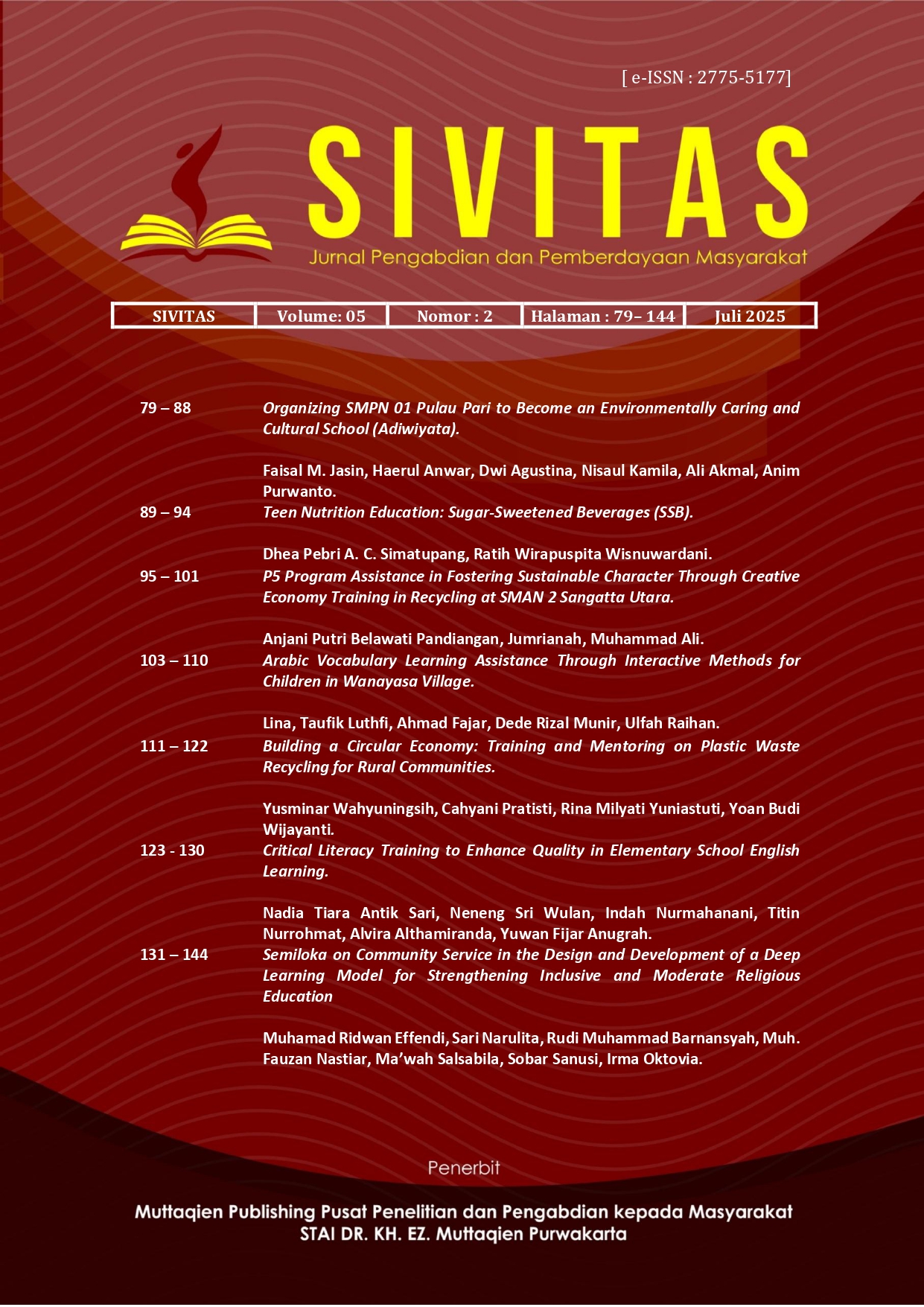P5 Programme Assistance in Shaping Sustainable Character through Creative Economy Recycling Training at SMAN 2 Sangatta Utara
Keywords:
P5 Program Assitance, Recycle Creative Economy, Sustainable CharacterAbstract
The integration of Pancasila values in education faces various challenges, especially in the era of globalization, digitalization and social change. Today's students are exposed to a variety of external influences that can influence the understanding and application of these values. Globalization brings the influx of foreign cultures which often conflict with local values, including Pancasila. Implementation of the creative economy through recycled design can have a positive impact on local economic development. Student involvement in creative economic activities not only enriches their skills in the fields of design and production, but can also become social capital that supports community development. This research aims to find out how p support P5 in forming sustainable character through recycling creative economy training at SMAN 2 Sangatta Utara. The research method used in the research is a qualitative approach with a descriptive type. This research was conducted at SMA Negeri 2 Sangatta Utara. The informants in this research were Deputy Head of Curriculum, Subject Teacher, Students of North Sangatta 2 High School. Data collection was carried out using documentation, observation and interview techniques. Based on research results, it shows that this program provides space for students to gain a holistic learning experience, supporting character formation based on Pancasila values. Creativity and environmental awareness through recycled design shows students' ability to think creatively and innovatively. Through preparing teaching modules, monitoring activities, and evaluating programs, teachers ensure that P5 objectives are achieved effectively. With this approach, the environmental culture that has become part of the school's vision is increasingly embedded in students' lives, both through intracurricular and extracurricular activities. The P5 program has a significant impact on student character formation. They become more confident, responsible, and able to work together in a team. The implementation of P5 which is integrated with creative economy learning and recycling design gives students the freedom to develop their own potential according to their interestsReferences
Kahfi, A. (2022). Implementasi profil pelajar Pancasila dan Implikasinya terhadap karakter siswa di sekolah. DIRASAH: Jurnal Pemikiran Dan Pendidikan Dasar Islam, 5(2), 138–151.
Kurniawan, S., & Rose, K. R. (2013). Pendidikan karakter: konsepsi & implementasinya secara terpadu di lingkungan keluarga, sekolah, perguruan tinggi, & masyarakat.
Lickona, T. (2022). Mendidik untuk membentuk karakter. Bumi Aksara.
Reniati, R. (2012). Keunggulan Bersaing Melalui Inovasi Bisnis Sebuah Desain: Kreativitas Organisasi, Kompetensi Kewirausahaan Dan Orientasi Pasar. Indonesian Journal of Economics and Business, 2(2).
Restrepo, F. B., & Marquez, I. D. (2015). Orange Economy, terj. Hedwigis Hapsari (Jakarta: Mizan, 2015).
Santika, I. W. E. (2022). Penguatan nilai-nilai kearifan lokal bali dalam membentuk profil pelajar pancasila. Jurnal Pendidikan Dan Konseling (JPDK), 4(4), 6182–6195.
Zuriah, N., & Sunaryo, H. (2022). Konstruksi profil pelajar pancasila dalam buku panduan guru PPKN di sekolah dasar. Jurnal Civic Hukum, 7(1).
Published
How to Cite
Issue
Section
Copyright (c) 2025 Anjani Putri Belawati Pandiangan, Jumrianah Jumrianah, Muhammad Ali

This work is licensed under a Creative Commons Attribution-ShareAlike 4.0 International License.
SIVITAS: Jurnal Pengabdian dan Pemberdayaan Masyarakat allow the author(s) to hold the copyright without restrictions and allow the author(s) to retain publishing rights without restrictions and authors who publish with this journal agree to the following terms:
In developing strategy and setting priorities, SIVITAS: Jurnal Pengabdian dan Pemberdayaan Masyarakat recognize that free access is better than priced access, libre access is better than free access, and libre under CC-BY-SA or the equivalent is better than libre under more restrictive open licenses. We should achieve what we can when we can. We should not delay achieving free in order to achieve libre, and we should not stop with free when we can achieve libre.
SIVITAS: Jurnal Pengabdian dan Pemberdayaan Masyarakat has a CC-BY SA license or its equivalent as the optimal license for publication, distribution, use and reuse of scientific work. This license is under a Creative Commons Attribution 4.0 International License.
You are free to:
- Share — copy and redistribute the material in any medium or format
- Adapt — remix, transform, and build upon the material for any purpose, even commercially.
- The licensor cannot revoke these freedoms as long as you follow the license terms.











